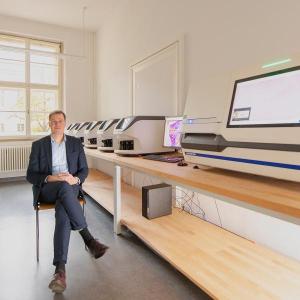AI in medicine: new approach for more efficient diagnostics
24 Oct 2024
Researchers from LMU, TU Berlin and Charité have developed a new AI tool that can also detect less common diseases in the gastrointestinal tract using imaging data.
24 Oct 2024
Researchers from LMU, TU Berlin and Charité have developed a new AI tool that can also detect less common diseases in the gastrointestinal tract using imaging data.

Professor Frederick Klauschen is Director of the Institute of Pathology at LMU. | © LMU
AI is already being used in many areas of medicine and has great potential to support doctors in diagnosing diseases using imaging data. However, AI models need to be trained with numerous examples, which are generally only available in sufficient quantities for common diseases. "It would be as if a GP only had to diagnose coughs, colds and hoarseness," says Professor Frederick Klauschen, Director of the Institute of Pathology at Ludwig Maximilian University in Munich. "The real challenge is to also recognize the rarer diseases. The current AI models often overlook these or classify them incorrectly."
Together with the working group of Professor Klaus-Robert Müller from the Technical University of Berlin/BIFOLD and colleagues from Charité - Universitätsmedizin Berlin, Klauschen has now developed a novel approach that overcomes this limitation: As the scientists report in the New England Journal of Medicine AI (NEJM AI), their new model only requires training data from common findings in order to reliably identify the less common diseases as well. This can improve diagnostic reliability and significantly reduce the workload of pathologists in the future.
Learning from normality
The new approach is based on anomaly detection: from the very precise characterization of normal tissue and findings of common diseases, the model learns to recognize and display deviations without having to be specifically trained for these rarer cases. For their study, the researchers collected two large data sets of microscopic images of tissue sections from gastrointestinal biopsies with the associated diagnoses. The ten most common findings - including normal findings and very common diseases such as chronic gastritis - accounted for around 90 percent of the cases, while the remaining 10 percent contained a total of 56 clinical pictures, including many types of cancer.
To train and evaluate their model, the researchers used a total of 17 million histological images from 5,423 cases. "We compared different technical approaches and our best model detected a wide range of rarer gastrointestinal pathologies, including rare primary or metastatic cancers, with high reliability. To our knowledge, no other published AI tool can do this," says Müller. With the help of so-called heat maps, it is also possible to show in color where anomalies are present in the tissue section.
Significant relief during diagnosis
By identifying normal findings and common diseases and pointing out abnormalities, the new AI model, which is to be further improved in the future, could provide crucial support for doctors. Although all findings must be confirmed by pathologists, "Doctors could save a lot of time because normal findings and a certain proportion of diseases can be diagnosed by AI. This applies to around a quarter to a third of cases," says Klauschen. "And for the remaining cases, AI can make prioritization easier and reduce overlooked diagnoses. That would be a huge step forward."
J. Dippel & N. Prenißl et al.: AI-based Anomaly Detection for Clinical-Grade Histopathological Diagnostics. NEJM AI 2024